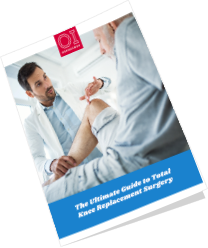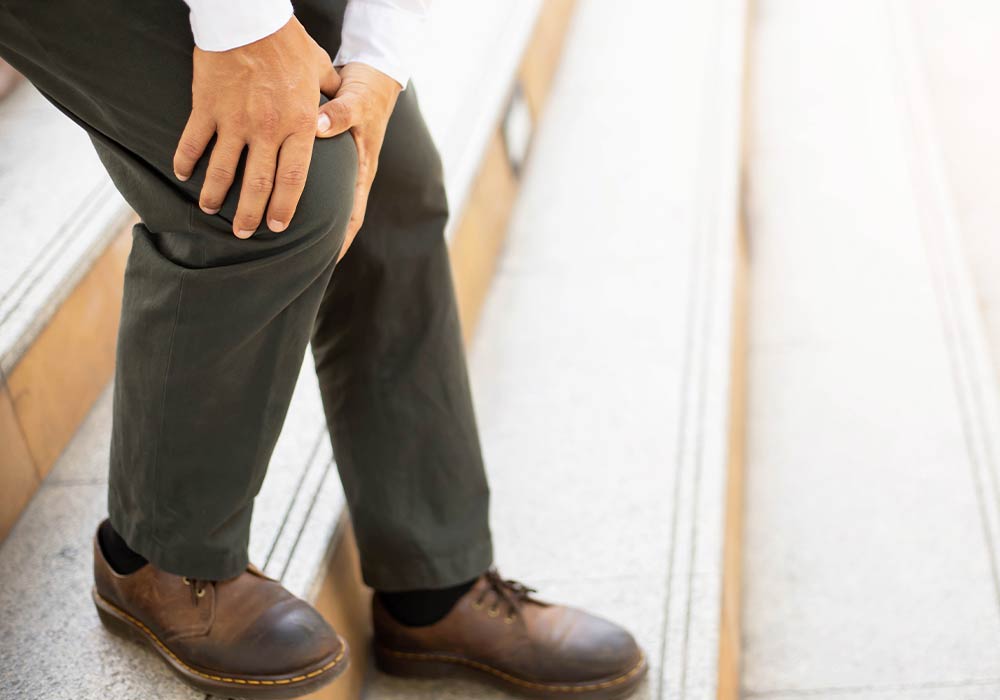Have you been suffering from knee pain that seems to be getting progressively worse? You might be living with knee osteoarthritis.
Also called degenerative arthritis, osteoarthritis is the most common type of arthritis and is most often related to aging. This progressive disease is associated with the breakdown of cartilage in your joints. It can occur in almost any joint in the body but is especially common in the knees.
Read on to learn what knee osteoarthritis typically feels like, how you can treat your knee pain with at-home remedies and when you should consult a doctor for further treatment.
Knee osteoarthritis symptoms
Knee osteoarthritis is a “wear and tear” or degenerative type of arthritis that develops gradually when your knee joint’s cartilage wears away. This condition causes bone-on-bone rubbing and can produce bone spurs.
Osteoarthritis develops slowly, so symptoms develop over time, and pain increases gradually. Knee osteoarthritis can sometimes develop as a secondary condition following a traumatic knee injury.
The most common symptoms of knee arthritis include:
- Knee pain or inflammation that develops gradually over time
- Swelling in the knee
- Stiffness in the knee joint that makes it hard to bend and straighten the knee
- Pain in the knee joint after activity (e.g., walking, climbing, going downstairs or standing up from sitting)
- The knee locks or sticks during movement
- Popping, cracking or grinding when moving the knee
- Weakness or buckling in the knee
- Pain or stiffness after sitting with the knee bent
- The knee joint is tender to the touch
What can you do for pain relief if you have knee osteoarthritis?
The Arthritis Foundation partnered with the American College of Rheumatology (ACR) to develop treatment guidelines for managing hand, hip and knee osteoarthritis.
Some of those recommendations you can try at home include:
- Losing excess body weight
- Exercising (aerobic, strength training, yoga)
- Using aids like a cane or orthotic shoe inserts
- Topical or oral non-steroidal anti-inflammatory drugs (NSAIDs)
When should I see a doctor for my knee arthritis?
If you have had worsening knee pain for several months and resting the knee or at-home remedies have not helped, you should consider seeing a knee specialist. While there is no cure for knee arthritis, there are many good treatment options to relieve your pain and discomfort.
Your knee doctor will typically recommend non-surgical treatment options for your knee osteoarthritis to start, including:
- Activity minimization (e.g., switching from high-impact to low-impact activity)
- Weight loss
- Physical therapy
- Bracing
- Anti-inflammatory medications
- Corticosteroid (cortisone) injections
- PRP injection
- Tissue and cell therapies
Will I need surgery for knee osteoarthritis?
If non-surgical treatment options offer no pain relief, your physician may recommend surgery for knee osteoarthritis.
The type of knee surgery your doctor recommends will depend on the severity of your arthritis and your symptoms. Some surgical options for knee osteoarthritis include:
- Arthroscopy: A small incision is made to treat joint problems; not especially common and is primarily used when arthritis is accompanied by a degenerative meniscal tear.
- Osteotomy: A knee surgeon cuts either the tibia or femur and then reshapes it to relieve pressure on the knee joint. This procedure is used only for young, very active patients with early-stage knee osteoarthritis that has only damaged one side.
- Partial knee replacement or total knee replacement: Your surgeon will remove the damaged cartilage and bone and replace it with new metal or plastic joint surfaces.
Schedule an appointment
If you’ve been dealing with knee osteoarthritis pain, schedule an appointment with one of our orthopedic specialists. Our knee experts will work with you to create a treatment plan that fits your lifestyle and helps you get the relief you deserve.
If your injury or condition is recent, you can walk right into one of our OrthoIndy Urgent Care locations for immediate care. For rehabilitation and physical therapy, no referral is needed to see one of our physical therapists.

The Ultimate Guide to Knee Pain Relief
Take control of your knee pain, learn about treatment options, and find out if surgery might be able to help you get back to normal.





